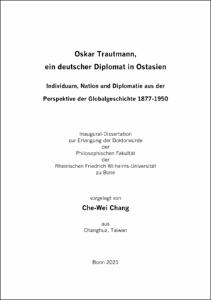Oskar Trautmann, ein deutscher Diplomat in OstasienIndividuum, Nation und Diplomatie aus der Perspektive der Globalgeschichte 1877-1950

Oskar Trautmann, ein deutscher Diplomat in Ostasien
Individuum, Nation und Diplomatie aus der Perspektive der Globalgeschichte 1877-1950

| dc.contributor.advisor | Kießling, Friedrich | |
| dc.contributor.author | Chang, Che-Wei | |
| dc.date.accessioned | 2021-09-17T06:51:17Z | |
| dc.date.available | 2021-09-17T06:51:17Z | |
| dc.date.issued | 17.09.2021 | |
| dc.identifier.uri | https://hdl.handle.net/20.500.11811/9301 | |
| dc.description.abstract | Der deutsche Botschafter in China, Oskar Trautmann, ist durch die Trautmann-Vermittlung kurz nach Ausbruch des Zweiten Chinesisch-Japanischen Krieges weithin bekannt. Dennoch übersehen Forscher sowohl in Deutschland als auch in chinesischsprachigen Wissenschaftskreisen die Studien zu Trautmann selbst lange Zeit. Der Umfang der bisherigen Diplomatiegeschichte beschränkt sich auf „Nationen“ und die Perspektiven wichtiger politischer Persönlichkeiten und übersieht dabei die Begriffsbildung von Diplomatie, die Arbeitsweise der Diplomatie und die Rolle von Vermittlern. Der Cultural Turn, der seit den 1990er Jahren unter dem Einfluss von Linguistik und Kulturanthropologie stattgefunden hat, ermöglicht es der Geschichtswissenschaft, Barrieren durch bisherige Theorien, Methoden und historische Quellen zu durchbrechen. Aus kulturhistorischer Sicht soll Diplomatie als politische Plattform der interkulturellen Kommunikation verstanden werden. Diese Studie unternimmt sowohl theoretisch als auch methodisch Versuche, die Möglichkeit des kulturellen Zugangs zur Erforschung der Diplomatiegeschichte aus einer Globalisierungsperspektive zu untersuchen. Mit dem großen Bestand an persönlichen Journalen, Korrespondenzen und diplomatischen Akten, die Trautmann hinterlassen hat, analysiert diese Studie die diplomatische Geschichte Deutschlands gegenüber Ostasien vor dem Zweiten Weltkrieg und untersucht die persönlichen Konzepte des Diplomaten von Diplomatie, Wissenssystem und persönlichen Gefühlen. Die Studie beantwortet folgende Fragen: Wie beeinflusst ein Diplomat als primärer Agent diplomatischer Arbeit eine diplomatische Beziehung? Welche Faktoren bedingen einen Diplomaten? Wie trifft ein Diplomat eine Entscheidung und erfüllt seine Aufgabe? Wie sieht sich ein Diplomat als Regierungsbürokrat mit Popularisierungs-, Mediatisierungs- und Verstaatlichungswellen konfrontiert? Schließlich untersucht die Studie die Interaktionen und Beziehungen zwischen Trautmann und anderen Diplomaten, um zu untersuchen, wie sich diese Diplomaten durch Kommunikation zu einer besonderen Gruppe von Menschen mit unterschiedlichem kulturellem Hintergrund vernetzten und wie diese Gruppe von Menschen eine moderne diplomatische Arbeitsweise während der Zeit prägte und präsentierte die Entwicklung der Globalisierung. | en |
| dc.description.abstract | The German Ambassador to China, Oskar Trautmann, is widely known for the Trautmann Mediation shortly after the outbreak of the Second Sino-Japanese War. Nonetheless, researchers in both Germany and Chinese-speaking academic circles have long been overlooking the studies on Trautmann himself. The scope of previous diplomatic history studies is limited to “nations” and the perspectives of important political figures while overlooking the concept formation of diplomacy, operation modes of diplomacy, and the role of mediators. The cultural turn that took place under the influences of linguistics and cultural anthropology since the 1990s enables historical studies to break through barriers set by previous theories, methods, and historical sources. From the angle of cultural history, diplomacy shall be viewed as a political platform for cross-cultural communication. This study makes attempts in both theory and method to explore the possibility of the cultural approach to the study of diplomatic history from a globalization perspective. With the large volume of personal journals, correspondence, and diplomatic files left by Trautmann, this study analyzes the diplomatic history of Germany toward East Asia before WWII, and investigates the diplomat’s personal concepts of diplomacy, knowledge system, and personal sentiments. The study answers the following questions: how does a diplomat, as a primary agent of diplomatic work, influence a diplomatic relation? What factors condition a diplomat? How does a diplomat make a decision and perform his/her duty? How does a diplomat, as a government bureaucrat, face waves of popularization, mediatization, and nationalization? Lastly, the study examines the interactions and relationships between Trautmann and other diplomats to delve into how these diplomats networked through communication to form a special group of people with diversified cultural backgrounds, and how this group of people shaped and presented a modern diplomatic operation mode during the development of globalization. | en |
| dc.language.iso | deu | |
| dc.rights | In Copyright | |
| dc.rights.uri | http://rightsstatements.org/vocab/InC/1.0/ | |
| dc.subject | Oskar Trautmann | |
| dc.subject | Diplomatiegeschichte | |
| dc.subject | Trautmann-Vermittlung | |
| dc.subject | Deutsche Beziehungen zu China | |
| dc.subject | Globalgeschichte | |
| dc.subject | Individuum | |
| dc.subject.ddc | 900 Geschichte | |
| dc.title | Oskar Trautmann, ein deutscher Diplomat in Ostasien | |
| dc.title.alternative | Individuum, Nation und Diplomatie aus der Perspektive der Globalgeschichte 1877-1950 | |
| dc.type | Dissertation oder Habilitation | |
| dc.publisher.name | Universitäts- und Landesbibliothek Bonn | |
| dc.publisher.location | Bonn | |
| dc.rights.accessRights | openAccess | |
| dc.identifier.urn | https://nbn-resolving.org/urn:nbn:de:hbz:5-63813 | |
| ulbbn.pubtype | Erstveröffentlichung | |
| ulbbnediss.affiliation.name | Rheinische Friedrich-Wilhelms-Universität Bonn | |
| ulbbnediss.affiliation.location | Bonn | |
| ulbbnediss.thesis.level | Dissertation | |
| ulbbnediss.dissID | 6381 | |
| ulbbnediss.date.accepted | 19.08.2021 | |
| ulbbnediss.institute | Philosophische Fakultät : Institut für Geschichtswissenschaft (IGW) | |
| ulbbnediss.fakultaet | Philosophische Fakultät | |
| dc.contributor.coReferee | Scholtyseck, Joachim | |
| ulbbnediss.contributor.gnd | 1241846049 |
Dateien zu dieser Ressource
Das Dokument erscheint in:
-
E-Dissertationen (712)




